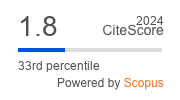Desain Dempster Shafer dan Fuzzy Expert System dalam Mendeteksi Dini Penyakit Stroke
Abstract
The increasing population in Indonesia, which is 265 million people in 2018, causes an increase in the community's disease sufferers. Unfortunately, the number of hospitals in the area has not increased even though the population continues to grow, which impacts the community's lack of information and knowledge in dealing with some serious diseases such as stroke that attacks quickly. Stroke is the leading cause of disability and the number two cause of death in the world where 6.2 million people died in 2015 and is a complex medical problem that requires the diagnosis of a neurologist or internist. Still, not all doctors are in the district and provide services with fast. Temporary stroke symptoms are called transient ischemic attacks (TIA), which are warning signs before having a stroke, it requires how to recognize the signs of a stroke early and treat it as a medical emergency. Based on this problem, it is needed an expert system design that can diagnose stroke early and provide information about stroke to the community based on expert sources with an android mobile phone, making it accessible to the broader community, including in the district. The system design uses the Dempster Shafer Method to measure the uncertainty of 20 stroke symptoms. The disease slices outcome will produce a percentage of the likelihood of stroke, hypertension / high blood pressure, fever, and heart disease. As well as Fuzzy Logic as logical logic in processing 9 patient's medical history. The authors combined the two methods in providing a stroke diagnosis based on symptoms and patient history and then evaluated using several metrics, including accuracy, precision, sensitivity (recall), F-measure (F1 score), and specificity so that an expert system score was obtained of 0.786 which shows good expert system performance.
Downloads
References
Z. Abrishami and H. Tabatabaee, “Design of A Fuzzy Expert System And A Multi-Layer Neural Network System For Diagnosis Of Hypertension,” 2015.
V. Adelina, D. E. Ratnawati, and M. A. Fauzi, “Klasifikasi Tingkat Risiko Penyakit Stroke Menggunakan Metode GA-Fuzzy Klasifikasi Tingkat Risiko Penyakit Stroke Menggunakan Metode GA- Fuzzy Tsukamoto,” J. Pengemb. Teknol. Inf. dan Ilmu Komput. Univ. Brawijaya, 2018.
J. R. Villar, S. González, J. Sedano, C. Chira, and J. M. Trejo-Gabriel-Galan, “Improving human activity recognition and its application in early stroke diagnosis,” Int. J. Neural Syst., 2015.
T. Djatna, M. K. D. Hardhienata, and A. F. N. Masruriyah, “An intuitionistic fuzzy diagnosis analytics for stroke disease,” J. Big Data, 2018.
M. B. Ulum and V. Tundjungsari, “Designing fuzzy expert system to identify child intelligence,” Telkomnika (Telecommunication Comput. Electron. Control., 2018.
A. Sulistyohati, T. Hidayat, K. Kunci: Ginjal, S. Pakar, and M. Dempster-Shafer, “Aplikasi Sistem Pakar Diagnosa Penyakit Ginjal Dengan Metode Dempster-Shafer,” Semin. Nas. Apl. Teknol. Inf., 2008.
B. H. Hayadi and A. Setiawan, “Sistem Berbasis Pengetahuan Dengan Menggunakan Fuzzy Tsukamoto (Untuk Kesehatan Dan Perawatan Bayi),” Semin. Nas. Teknol. Inf. dan Komun. 2016, 2016.
J. Kanggeraldo, R. P. Sari, and M. I. Zu, “Sistem Pakar Untuk Mendiagnosis Penyakit Stroke Hemoragik dan Iskemik Menggunakan Metode Dempster Shafer,” J. RESTI (Rekayasa Sist. dan Teknol. Informasi), 2018.
Y. Yueniwati, Deteksi Dini Stroke Iskemia:dengan Pemeriksaan Ultrasonografi vaskular dan variasi genetika. 2015.
S. H. Kusumadewi, “Fuzzy Multi-Attribute Decision Making (Fuzzy MADM),” Graha Ilmu Yogyakarta, 2006.
L. Laurentinus and S. Rinaldi, “Implementasi Metode Analytical Hierarchy Process dan Simple Additive Weighting untuk Pemilihan Dosen Terbaik Studi Kasus STMIK Atma Luhur,” J. Teknol. Inf. dan Ilmu Komput., 2019.
Copyright (c) 2020 Jurnal RESTI (Rekayasa Sistem dan Teknologi Informasi)

This work is licensed under a Creative Commons Attribution 4.0 International License.
Copyright in each article belongs to the author
- The author acknowledges that the RESTI Journal (System Engineering and Information Technology) is the first publisher to publish with a license Creative Commons Attribution 4.0 International License.
- Authors can enter writing separately, arrange the non-exclusive distribution of manuscripts that have been published in this journal into other versions (eg sent to the author's institutional repository, publication in a book, etc.), by acknowledging that the manuscript has been published for the first time in the RESTI (Rekayasa Sistem dan Teknologi Informasi) journal ;








